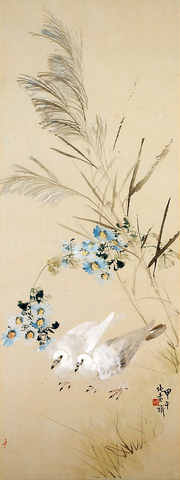The Hwa Kang Museum is up Yangmingshan, Taipei, in a corner of the Chinese Culture University campus. Established in 1971 by the university's founder Zhang Qi-yun (
This four-floor building has approximately 549m2 of
exhibition space.

PHOTO: Courtesy of the Hwa Kang Museum
The first floor gallery is open for exhibitions to both campus artists and members of the public. The third floor is set to display pieces from the museum's
permanent collections of folk arts and Chinese ceramics. The fourth floor exhibition area is designated for large-scale, semester-long thematic presentations of fine arts. The museum's permanent
collection of modern and
contemporary Chinese paintings and calligraphy contains more than 4,000 masterpieces by Chinese artists. Big-name artists include Wang Yang-ming (
In its Chinese ceramics
collection, porcelain and pottery objects are covered through the ages, from the Neolithic Yang-shao culture to the Ming and Qing dynasties.
The folk art and woodblock print collections range from aged furniture, to embroidery, woodblock prints, temple and
monastery art and Aboriginal
cultural artifacts. All these remarkable collections require at least a half-day trip for serious art lovers.
Currently on the fourth floor, curator Margaret Chen (
The late Zhang Shu-qi never set foot in Taiwan in his lifetime and is thus unknown to the general public. Yet, his outstanding skill at drawing pigeons has been lauded by the late Xu Bei-hong (
Born in 1900, Zhang painted the 3m x 3m Hundred Doves in 1941, when China was being attacked by the Japanese. Applying olive trees and azalea flowers as a background, the painting vividly depicts 100 or more doves, each with different expressions. The painting suggests the artist's desire for peace at a time when the clouds of war were gathering.
The painting was subsequently presented to former US president Franklin D. Roosevelt as a gift in commemoration of his third
presidential inauguration. It was displayed in the White House and later became part of the permanent collection of the former president's library.
Zhang was a talented landscape and birds-and-flower painter. One daring approach that Zhang adopted was to use colored Chinese painting papers, instead of normal white ones, for many of his works done in the US.
"He developed a preference for using powdered lead white and red pigment on colored paper. His colors thus became extremely eye-catching," Margaret Chen said. Fang Yi-min
(方亦民), widow of Zhang Shu-qi, donated 40 of her late husband's works to the university in 1969, after Zhang passed away in 1957.
Zhang Shu-qi expresses his desire for peace through painting doves.

Taiwan has next to no political engagement in Myanmar, either with the ruling military junta nor the dozens of armed groups who’ve in the last five years taken over around two-thirds of the nation’s territory in a sprawling, patchwork civil war. But early last month, the leader of one relatively minor Burmese revolutionary faction, General Nerdah Bomya, who is also an alleged war criminal, made a low key visit to Taipei, where he met with a member of President William Lai’s (賴清德) staff, a retired Taiwanese military official and several academics. “I feel like Taiwan is a good example of

March 2 to March 8 Gunfire rang out along the shore of the frontline island of Lieyu (烈嶼) on a foggy afternoon on March 7, 1987. By the time it was over, about 20 unarmed Vietnamese refugees — men, women, elderly and children — were dead. They were hastily buried, followed by decades of silence. Months later, opposition politicians and journalists tried to uncover what had happened, but conflicting accounts only deepened the confusion. One version suggested that government troops had mistakenly killed their own operatives attempting to return home from Vietnam. The military maintained that the

Jacques Poissant’s suffering stopped the day he asked his daughter if it would be “cowardly to ask to be helped to die.” The retired Canadian insurance adviser was 93, and “was wasting away” after a long battle with prostate cancer. “He no longer had any zest for life,” Josee Poissant said. Last year her mother made the same choice at 96 when she realized she would not be getting out of hospital. She died surrounded by her children and their partners listening to the music she loved. “She was at peace. She sang until she went to sleep.” Josee Poissant remembers it as a beautiful

Before the last section of the round-the-island railway was electrified, one old blue train still chugged back and forth between Pingtung County’s Fangliao (枋寮) and Taitung (台東) stations once a day. It was so slow, was so hot (it had no air conditioning) and covered such a short distance, that the low fare still failed to attract many riders. This relic of the past was finally retired when the South Link Line was fully electrified on Dec. 23, 2020. A wave of nostalgia surrounded the termination of the Ordinary Train service, as these train carriages had been in use for decades